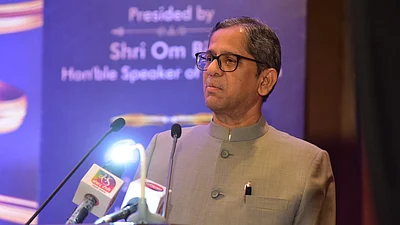We are seeing hospitals being run like companies: CJI NV Ramana
The Chief Justice of India said that with the growing and unchecked corporatisation of healthcare, profit-making has become more important than service to society.

CJI NV Ramana
Published on :
23 Aug, 2022, 10:04 pm
3 min read
Chief Justice of India (CJI) NV Ramana on Tuesday highlighted the importance of bringing in a law to address the issue of fraudulent healthcare services that patients fall prey to.
null
The CJI was speaking at the inaugural National Academy of Medical Sciences’ (NAMS, Delhi) public oration on ‘Law and Medicine’.
Talking in the context of the rise of quackery in India, the CJI Ramana explained,
“Quackery begins where awareness ends. Where there is room for myths, there is room for quackery. Quackery is the biggest disease affecting India. Owing to the financial and time constraints, a huge majority of Indian population approaches these untrained and uncertified doctors. Lack of awareness and knowledge, misplaced belief, and sheer inaccessibility has massive ramifications on the health of the country, particularly the rural and under-privileged India. Need of the hour is to bring in a legislation to save people from falling prey to fraudulent practices in the name of treatment.“
The CJI said that he would speak about certain aspects of the medical education system in the country after his retirement.
In his speech, the CJI said that the practice of medicine was the bridge between science and technology, and the human mind and body.
“Doctors express this scientific understanding day in and day out through their medical practice. There are very few professions that exist in a constant state of flux in the way the medical profession does. In fact, the medical profession is most reflective of technological and the scientific developments. It is sensitive to every advancement in technology and is constantly striving to improve the care and services it offers.“
He also touched upon the significance of safeguarding the health of citizens, which he said the Constitution-makers laid great emphasis on.
“Our courts also have played significant role in realizing these goals and shaping the health care policies of our country. The Directive Principles have placed emphasis on the minutest details of health, nutrition, working conditions and welfare. In addition to the Directive Principles, the Constitution, in 11th and 12th schedules, places an obligation to provide safe drinking water, sanitation and adequate healthcare upon the local bodies.“
The Chief Justice went on to highlight the similarities between those practicing law and medicine.
“A good lawyer, like a good doctor, must always work earnestly towards imbibing and accumulating greater knowledge. The possibilities for growth in both fields are seemingly endless. Both medicine and law are the oldest professions in the world. They arise from basic necessities of dignified human existence. People place their faith in lawyers and doctors alike, trusting that they will act in best interests of those who approach them.”
Next, he emphasised that the commercialisation of healthcare needs to be checked.
“Private hospitals are being opened at an exponential rate. This is not necessarily a bad thing, but there is a glaring need for balance. We are seeing hospitals being run like companies, where profit making is more important than service to society. Due to this, hospitals and doctors alike are desensitized towards the plight of patients. They are just numbers for them. This trend has also spread monopoly and is deepening the inequities in access to health care.“
This meant that the poor reach doctors at a very late stage, he highlighted.
“Exorbitant medical fees coupled with excessive barriers has made it almost impossible for the poor to get decent healthcare. It is primarily the cost of healthcare that is forcing people to suppress their healthcare needs and well-being. The heart-breaking fact is that the crucial preventive stage is often lost when people suppress their health needs. They only approach the doctors when it is unmanageable and has crossed a certain threshold.“
Attacks on doctors unfortunate
The CJI’s speech also touched upon the aspect of attacks on doctors during the COVID-19 pandemic.
“During the pandemic I saw various instances where doctors had been threatened, abused, attacked, and shunned. Despite this, they continued working on the front lines. This negative response towards doctors is truly unfortunate. Several false cases are being lodged against upright and hardworking doctors. They need a better, and more secure, working environment. We must foster an environment where more young people want to become doctors to serve Indian society.”
CJI Ramana said such developments are leading to a massive brain drain, and to prevent this, doctors must be incentivised to remain in India.
“…the government must look out for the welfare of its doctors and improve their working conditions. The government must think of stronger incentives to make doctors accessible to rural population.









![[3166] Spring in countryside [3166] Spring in countryside](https://live.staticflickr.com/65535/53702864570_362d4640ef_s.jpg)

